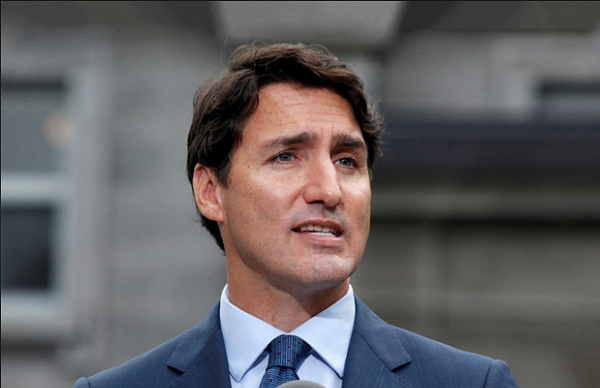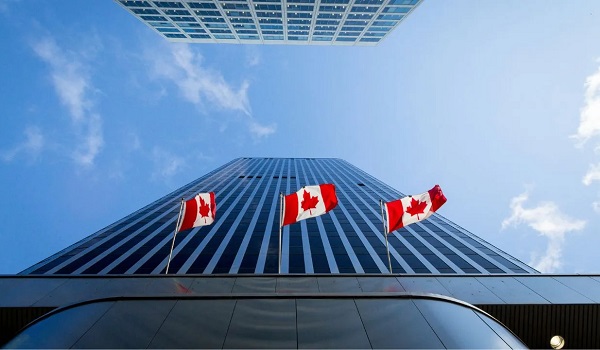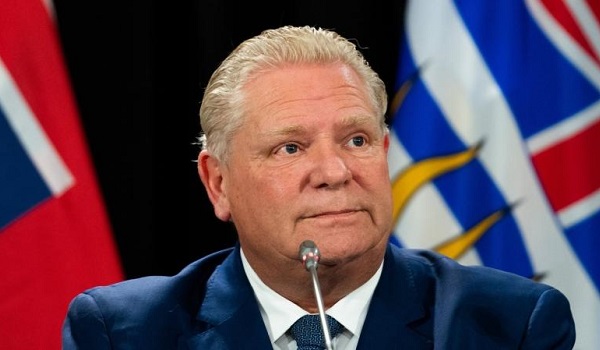Canada vows to improve spending on the border in response to Trump’s tariffs
The federal government says it will pump more money into Canada Border Services Agency and the RCMP in an apparent attempt to placate U.S. president-elect Donald Trump, who has promised steep tariffs over illegal migration and drug smuggling from Canada into the United States.
Ottawa’s pledge to spend more on border security followed an emergency first ministers’ meeting Wednesday evening between Prime Minister Justin Trudeau and provincial and territorial leaders to address Mr. Trump’s announcement that when he takes power in January, both Canada and Mexico will face 25 per-cent tariffs on their products until they take sufficient action on illegal crossings and drugs.
Public Safety Minister Dominic LeBlanc and Deputy Minister Chrystia Freeland emerged from the 90-minute virtual meeting to announce more border funding, although they offered no details or a timeline.
Ottawa shifted its messaging from earlier this week when officials had stressed that it was Mexico, not Canada, that posed the biggest border problem for the United States. However, several premiers have been pressing the federal government to address the border issue as part of its response to Mr. Trump’s tariffs and head off the potential impact on more than half a trillion dollars in Canadian exports.
The focus on illegal crossings into the U.S. is also a change from a string of recent announcements by Ottawa, including one just last week, aimed at stemming a potential influx of migrants and asylum seekers attempting to enter Canada in the wake of Mr. Trump’s election victory last month.
“We believe that there is a circumstance where we can make additional investments to reassure Canadians that all of the measures necessary are in place and will continue to be in place,” Mr. LeBlanc told reporters.
Even as he talked of new investment, Mr. LeBlanc insisted Canada is already doing a good job of safeguarding the border. “We believe unequivocally that the Canadian border is secure.”
He said Ottawa believes part of the problem is a lack of appreciation of what Canada does to safeguard the border. Wednesday’s meeting discussed the need to demonstrate border security more openly to Canadians and Americans, he added.
“We need to reassure Canadians and Americans that we are very much on top of this,” Mr. LeBlanc said.
Ms. Freeland urged the provinces to stick together with Ottawa. “The way we meet this challenge successfully is by presenting a united front, especially when it comes to our conversations with our American neighbours,” she said.
“Now is really a moment for us not to squabble amongst ourselves.”
She said while the U.S. is critical to the Canadian economy, “the United States also depends on us.”
A significant number of premiers made it clear Wednesday, before and after the meeting, that they expected serious border measures from Ottawa.
In a statement after the meeting, Ontario Premier Doug Ford said he complained during the meeting about Ottawa’s laggard pace in responding to U.S. economic and security concerns.
“I stressed that the federal government has been slow to react and is stuck on its backfoot,” he said.
“I expressed my hope that this evening’s meeting is the start of a more pro-active approach from the federal government, including by showing that it takes the security of our border seriously by cracking down on illegal border crossings and stopping the transport of guns and illegal and illicit drugs like fentanyl, or risk the economic chaos of Trump tariffs.”
Alberta Premier Danielle Smith said her province will be “acting urgently and decisively to patrol our own shared border with Montana, with more details to be announced soon in that regard.”
She said Canada needs to act swiftly to respond to address Mr. Trump’s concerns.
“Although I oppose any tariffs on Canadian or U.S. products, it is my view that President Donald Trump, and the tens of millions of Americans who voted for him, have valid concerns related to illegal migrants and drug smuggling at our shared border,” Ms. Smith said in a statement after the meeting.
“We know that the problem is much more serious at the Mexican-U. S. border, however, that does not diminish the need for the federal government and every province bordering the United States to take immediate steps to crack down heavily on these illegal border activities.”
The Ontario government is taking matters into its own hands, announcing Wednesday that it is launching a multimillion-dollar advertising campaign in the United States highlighting that country’s close economic ties with the province and the future possibilities between the two. The ads for the campaign, which launches Monday, were filmed before the U.S. election as the province sought to get ahead of a further shift toward protectionist trade policies regardless of who won, according to a senior Ontario government source.
The Globe and Mail is not identifying the source because they are not authorized to speak publicly about the campaign before it debuts.
Mr. Trump’s promised tariffs would hit the Canadian economy hard because the United States is Canada’s biggest trading partner. In 2023, Canada exported $592.7-billion in goods to the United States – more than 77 per cent of this country’s total exports that year.
Mr. Trump’s announcement is based on his complaint that Canada is not stopping migrants and fentanyl crossing the border into the U.S. According to numbers from U.S. Customs and Border Protection, in the last fiscal year, U.S. border patrol officers stopped people 23,721 times trying to cross illegally from Canada, more than double the 10,021 the year before. But it pales in comparison with the Mexican border, where border patrol officers stopped people more than 1.5 million times in the same time period.
One of Mr. Trudeau’s senior cabinet ministers on Wednesday said Canada agrees with Mr. Trump’s call to better police illegal migration and deadly drugs such as fentanyl moving across the Canada-United States border. Innovation Minister François-Philippe Champagne spoke to reporters Wednesday ahead of the meeting with premiers.
“The two things that president-elect Trump has said, whether it’s protecting our border, or interdicting fentanyl in the country – we agree,” Mr. Champagne said.
Speaking before the Wednesday meeting with Mr. Trudeau, Quebec Premier François Legault said the Prime Minister needs to reassure Mr. Trump by introducing a plan to secure the Canada-U. S. border.
“It’s important to secure the borders in both directions. We don’t want to have a new wave of immigrants, but it’s also important that Mr. Trudeau table a plan to reassure Mr. Trump,” Mr. Legault said in a brief press scrum at Quebec’s National Assembly Wednesday.
“Mr. Trump is telling us: ‘I’m going to impose 25-per-cent tariffs because I’m not satisfied with what Canada is doing at the borders.’ We should quickly take that argument away from Mr. Trump,” Mr. Legault said.
B.C. Premier David Eby, speaking with reporters in Victoria in advance of the virtual meeting with Mr. Trudeau, said that his province shares Mr. Trump’s concerns about border security. He said his province has repeatedly raised concerns with Ottawa about cuts to the Canadian Border Services Agency.
“There are important issues that we need to address at our border, that our government has been raising for a while with Ottawa, in particular, our concerns about cuts to CBSA amounting to more than $200-million and the impact that will have on our borders,” he said.
“We’re already we’re inspecting less than 2 per cent of the containers that come in. And knowing the impact of fentanyl on British Columbia, knowing the impact of imports through our ports on the toxic drug crisis that people face, not just here, but internationally, it’s a priority for us. It doesn’t justify the tariffs, but it does mean that we can talk about those issues as well.”
Manitoba Premier Wab Kinew told reporters after the meeting that it was a “constructive conversation” and said he told his fellow premiers he wants to be part of the Team Canada approach to strengthen ties with the U.S. He said he’s been calling for the federal government to boost investment in the RCMP in Manitoba as well as law enforcement generally.
“The point that I made to the prime minister and to the premiers on the call is listen, Manitobans have been long talking about drugs being an issue in our communities. This is going back many years, and so what’s the downside if we invest in law enforcement and we crack down on drug trafficking here at a time when that message might be well received in the States,” he said.
Before Wednesday’s meeting with Mr. Trudeau, Mr. Ford told reporters he had met with representatives of the U.S. Drug Enforcement Agency, the Ontario Provincial Police and the Canada Border Services Agency to discuss what Canada needs to do to tighten its borders. He said Ottawa needs to spend more on RCMP officers and its border agency.
Ontario, the Premier said, is adding more than 2,000 police officers a year, while the RCMP is adding just 1,200 because of a lack of funding. Mr. Ford said the OPP was open to partnering with the other agencies to improve border enforcement, such as on lakes and waterways, for example. He also said the CBSA and RCMP were “starving” for funds.
This article was first reported by Te Globe and Mail












